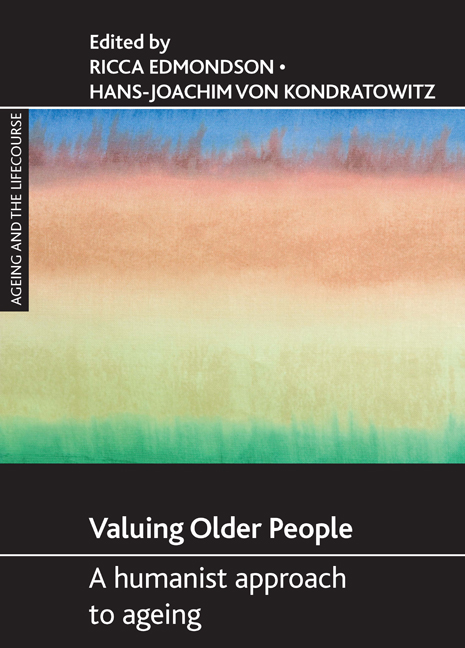Book contents
- Frontmatter
- Contents
- List of tables and figures
- Notes on contributors
- Acknowledgements
- Foreword
- Introduction
- Part One Religion, spirituality, cultural resources and creating meaning
- Part Two Norms, values and gerontology
- Part Three Ageing and wisdom? Conflicts and contested developments
- Afterwords
- Index
- Available titles in the Ageing and the Lifecourse series
fifteen - Talk about old age, health and morality
Published online by Cambridge University Press: 05 July 2022
- Frontmatter
- Contents
- List of tables and figures
- Notes on contributors
- Acknowledgements
- Foreword
- Introduction
- Part One Religion, spirituality, cultural resources and creating meaning
- Part Two Norms, values and gerontology
- Part Three Ageing and wisdom? Conflicts and contested developments
- Afterwords
- Index
- Available titles in the Ageing and the Lifecourse series
Summary
Introduction
How do older people approach fundamental issues involved in the process of growing older? What exactly does ageing mean to them – what changes does it bring to the ways they see themselves and their relations to the rest of society? This investigation tries to approach questions like these by responding to the ways in which people converse and interact in their daily lives. They do so not only directly but indirectly too, and the implications of their talk may be particularly eloquent and rich. The investigation gives special weight to conversation relating to health, a central preoccupation in contemporary notions of ageing. Indeed, questions connected to health contribute largely to the meanings bestowed on ageing itself. Here we see that approaches to health can themselves encapsulate and display profounder social attitudes, attitudes touching on what is desirable or undesirable for human beings, on what should be done and how we should relate to it – in a word, moral attitudes relating to ageing.
This chapter presents some findings of a discourse-analytical study of meanings conferred on old age and health in the talk of older people themselves. In contrast to commoner ways of studying norms and values, focusing directly on moral ideas, this chapter concentrates on the talk and the practical interaction in which moral arguments are used. This approach involves exploring whether and how notions of health and old age are constructed as moral matters, and what kinds of arguments can be interpreted as moral when they are used in real-life settings (Jayuusi, 1991; Bergmann, 1998; Nikander, 2002).
The account given here is based on biographical interviews with people who are 90 years of age or older. The arguments presented develop earlier approaches to these questions – for a fuller description of the analytical approach and data sets used, see Jolanki et al (2000); Jolanki (2004). The original 250 interviews that were taped (of which 184 were with women, 66 with men) were made in the region of Tampere, in southern Finland, in the years 1995-96, as part of a project called Vitality 90+ (Jylhä and Hervonen, 1999). The interviewees were approached because of their exceptionally high ages; most respondents participating in these biographical interviews were exceptional even within their own age group, since most still lived alone in their own homes and were relatively independent. Some in the overall project lived in sheltered housing or in nursing homes.
- Type
- Chapter
- Information
- Valuing Older PeopleA Humanist Approach to Ageing, pp. 261 - 274Publisher: Bristol University PressPrint publication year: 2009

